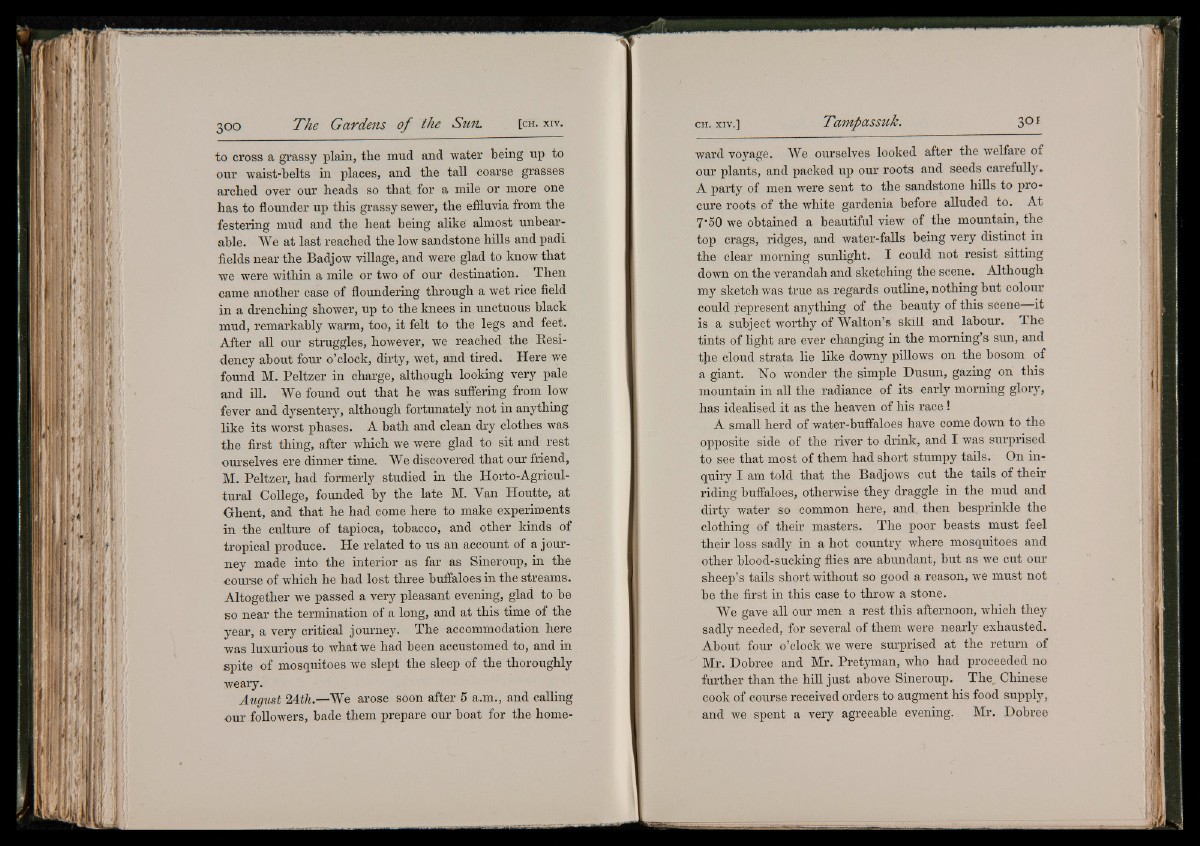
to cross a grassy plain, the mud and water being up to
our waist-belts in places, and the tall coarse grasses
arched over our heads so that for a mile or more one
has to flounder up this grassy sewer, the effluvia from the
festering mud and the heat being alike almost unbearable.
We at last reached the low sandstone hills and padi
fields near the Badjow village, and were glad to know that
we were within a mile or two of our destination. Then
came another case of floundering through a wet rice field
in a drenching shower, up to the knees in unctuous black
mud, remarkably warm, too, it felt to the legs and feet.
After all our struggles, however, we reached the Residency
about four o’clock, dirty, wet, and tired. Here we
found M. Peltzer in charge, although looking very pale
and ill. We found out that he was suffering from low
fever and dysentery, although fortunately not in anything
like its worst phases. A hath and clean dry clothes was
the first thing, after which we were glad to sit and rest
ourselves ere dinner time. We discovered that our friend,
M. Peltzer, had formerly studied in the Horto-Agricul-
tural College, founded by the late M. Van Houtte, at
Ohent, and that he had come here to make experiments
in the culture of tapioca, tobacco, and other kinds of
tropical produce. He related to us an account of a journey
made into the interior as far as Sineroup, in the
course of which he had lost three buffaloes in the streams.
Altogether we passed a very pleasant evening, glad to he
so near the termination of a long, and at this time of the
year, a very critical journey. The accommodation here
was luxurious to what we had been accustomed to, and in
spite of mosquitoes we slept the sleep of the thoroughly
weary.
August 24th.—We arose soon after 5 a.m., and calling
our followers, bade them prepare our boat for the homeward
voyage. We ourselves looked after the welfare of
our plants, and packed up our roots and seeds carefully.
A party of men were sent to the sandstone hills to procure
roots of the white gardenia before alluded to. At
7*50 we obtained a beautiful view of the mountain, the
top crags, ridges, and water-falls being very distinct in
the clear morning sunlight. I could not resist sitting
down on the verandah and sketching the scene. Although
my sketch was true as regards outline, nothing hut colour
could represent anything of the beauty of this scene it
is a subject worthy of Walton’s skill and labour. The
tints of light are ever changing in the morning’s sun, and
tjie cloud strata lie like downy pillows on the bosom of
a giant. No wonder the simple Dusun, gazing on this
mountain in all the radiance of its early morning glory,
has idealised it as the heaven of his race !
A small herd of water-buffaloes have come down to the
opposite side of the river to drink, and I was surprised
to see that most of them had short stumpy tails. On inquiry
I am told that the Badjows cut the tails of their
riding buffaloes, otherwise they draggle in the mud and
dirty water so common here, and. then besprinkle the
clothing of their masters. The poor beasts must feel
their loss sadly in a hot country where mosquitoes and
other blood-sucking flies are abundant, but as we cut our
sheep’s tails short without so good a reason, we must not
be the first in this case to throw a stone.
We gave all our men a rest this afternoon, which they
sadly needed, for several of them were nearly exhausted.
About four o’clock we were surprised at the return of
Mr. Dobree and Mr. Pretyman, who had proceeded no
further than the hill just above Sineroup. The, Chinese
cook of course received orders to augment his food supply,
and we spent a very agreeable evening. Mr. Dobree